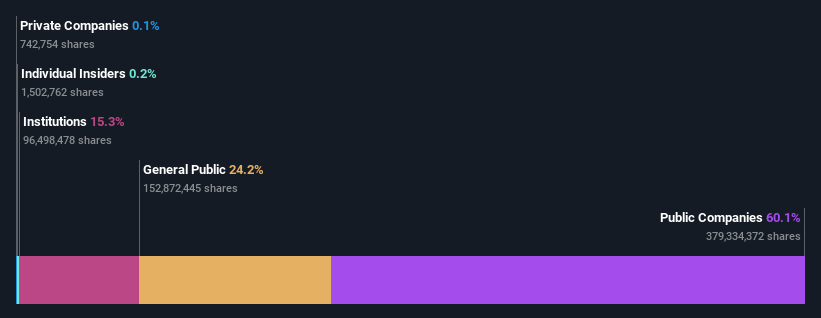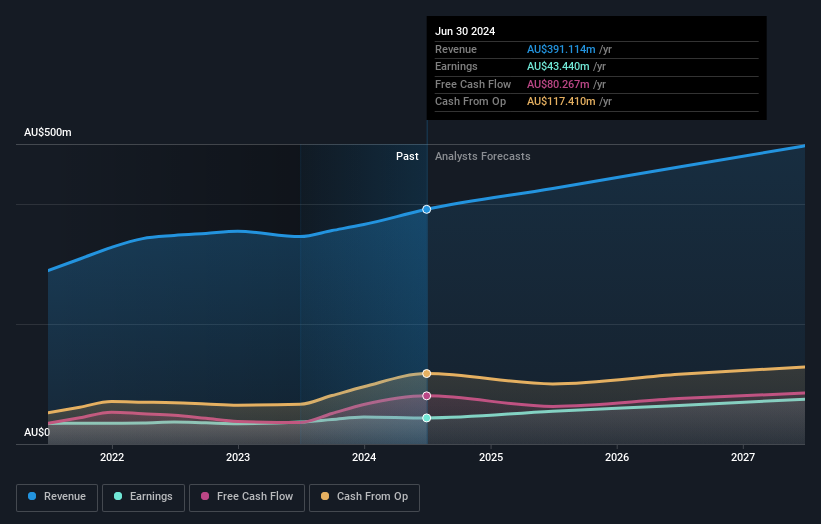Public companies among Domain Holdings Australia Limited's (ASX:DHG) largest stockholders and were hit after last week's 4.0% price drop
Key Insights
- Significant control over Domain Holdings Australia by public companies implies that the general public has more power to influence management and governance-related decisions
- 60% of the company is held by a single shareholder (Nine Entertainment Co. Holdings Limited)
- Institutional ownership in Domain Holdings Australia is 15%
To get a sense of who is truly in control of Domain Holdings Australia Limited (ASX:DHG), it is important to understand the ownership structure of the business. We can see that public companies own the lion's share in the company with 60% ownership. In other words, the group stands to gain the most (or lose the most) from their investment into the company.
And following last week's 4.0% decline in share price, public companies suffered the most losses.
Let's delve deeper into each type of owner of Domain Holdings Australia, beginning with the chart below.
See our latest analysis for Domain Holdings Australia

What Does The Institutional Ownership Tell Us About Domain Holdings Australia?
Institutions typically measure themselves against a benchmark when reporting to their own investors, so they often become more enthusiastic about a stock once it's included in a major index. We would expect most companies to have some institutions on the register, especially if they are growing.
We can see that Domain Holdings Australia does have institutional investors; and they hold a good portion of the company's stock. This suggests some credibility amongst professional investors. But we can't rely on that fact alone since institutions make bad investments sometimes, just like everyone does. It is not uncommon to see a big share price drop if two large institutional investors try to sell out of a stock at the same time. So it is worth checking the past earnings trajectory of Domain Holdings Australia, (below). Of course, keep in mind that there are other factors to consider, too.

Hedge funds don't have many shares in Domain Holdings Australia. Looking at our data, we can see that the largest shareholder is Nine Entertainment Co. Holdings Limited with 60% of shares outstanding. This implies that they have majority interest control of the future of the company. In comparison, the second and third largest shareholders hold about 9.1% and 2.2% of the stock.
While studying institutional ownership for a company can add value to your research, it is also a good practice to research analyst recommendations to get a deeper understand of a stock's expected performance. There are plenty of analysts covering the stock, so it might be worth seeing what they are forecasting, too.
Insider Ownership Of Domain Holdings Australia
While the precise definition of an insider can be subjective, almost everyone considers board members to be insiders. Company management run the business, but the CEO will answer to the board, even if he or she is a member of it.
I generally consider insider ownership to be a good thing. However, on some occasions it makes it more difficult for other shareholders to hold the board accountable for decisions.
Our most recent data indicates that insiders own less than 1% of Domain Holdings Australia Limited. It's a big company, so even a small proportional interest can create alignment between the board and shareholders. In this case insiders own AU$4.7m worth of shares. It is always good to see at least some insider ownership, but it might be worth checking if those insiders have been selling.
General Public Ownership
The general public-- including retail investors -- own 24% stake in the company, and hence can't easily be ignored. This size of ownership, while considerable, may not be enough to change company policy if the decision is not in sync with other large shareholders.
Public Company Ownership
Public companies currently own 60% of Domain Holdings Australia stock. We can't be certain but it is quite possible this is a strategic stake. The businesses may be similar, or work together.
Next Steps:
It's always worth thinking about the different groups who own shares in a company. But to understand Domain Holdings Australia better, we need to consider many other factors.
I always like to check for a history of revenue growth. You can too, by accessing this free chart of historic revenue and earnings in this detailed graph.
If you would prefer discover what analysts are predicting in terms of future growth, do not miss this free report on analyst forecasts.
NB: Figures in this article are calculated using data from the last twelve months, which refer to the 12-month period ending on the last date of the month the financial statement is dated. This may not be consistent with full year annual report figures.
Have feedback on this article? Concerned about the content? Get in touch with us directly. Alternatively, email editorial-team (at) simplywallst.com.
This article by Simply Wall St is general in nature. We provide commentary based on historical data and analyst forecasts only using an unbiased methodology and our articles are not intended to be financial advice. It does not constitute a recommendation to buy or sell any stock, and does not take account of your objectives, or your financial situation. We aim to bring you long-term focused analysis driven by fundamental data. Note that our analysis may not factor in the latest price-sensitive company announcements or qualitative material. Simply Wall St has no position in any stocks mentioned.
 Index Options
Index Options CME Group
CME Group Nasdaq
Nasdaq Cboe
Cboe TradingView
TradingView Wall Street Journal
Wall Street Journal